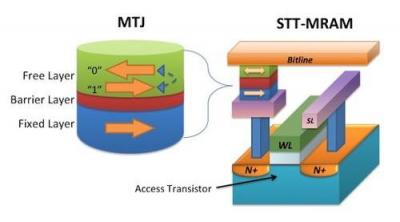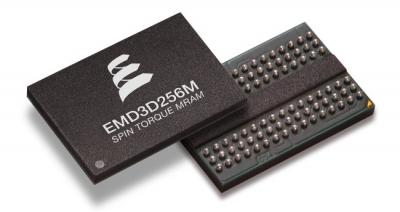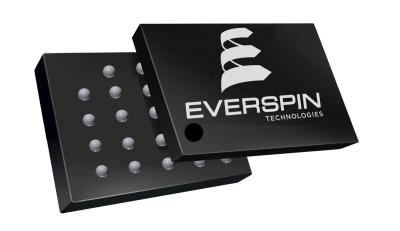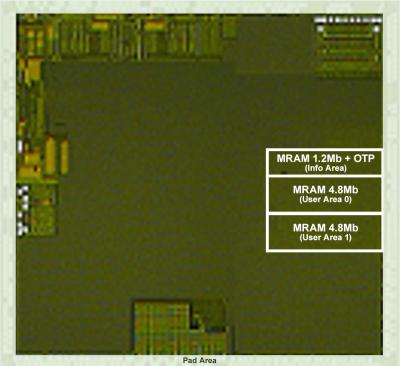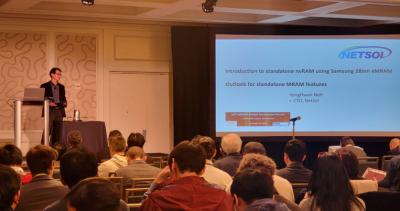STT-MRAM: Introduction and market status
STT-MRAM (also called STT-RAM or sometimes ST-MRAM and ST-RAM) is an advanced type of MRAM devices. STT-MRAM enables higher densities, low power consumption and reduced cost compared to regular (so-called Toggle MRAM) devices. The main advantage of STT-MRAM over Toggle MRAM is the ability to scale the STT-MRAM chips to achieve higher densities at a lower cost.
STT-MRAM has the potential to become a leading storage technology as it is a high-performance memory (can challenge DRAM and SRAM) that can scale well below 10nm and challenge the low cost of flash memory.
What is STT-MRAM?
STT stands for Spin-Transfer Torque. In an STT-MRAM device, the spin of the electrons is flipped using a spin-polarized current. This effect is achieved in a magnetic tunnel junction (MTJ) or a spin-valve, and STT-MRAM devices use STT tunnel junctions (STT-MTJ). A spin-polarized current is created by passing a current though a thin magnetic layer. This current is then directed into a thinner magnetic layer which transfers the angular momentum to the thin layer which changes its spin.
What is perpendicular STT-MRAM?
A "regular" STT-MRAM structure (similar to the one you see above) uses an in-plane MTJ (iMTJ). Some STT-MRAM devices use a more optimized structure called perpendicular MTJ (pMTJ) in which the magnetic moments are perpendicular to the silicon substrate surface.
Perpendicular STT-MRAM is more scalable compared to iMTJ STT-MRAM and is also more cost competitive. Perpendicular STT-MRAM is thus a more promising technology to replace DRAM and other memory technologies
STT-MRAM chips
Several companies, including IBM and Samsung, Everspin, Avalanche Technologies, Spin Transfer Technologies and Crocus are developing STT-MRAM chips. In April 2016 Everspin announced that it started shipping 256Mb ST-MRAM samples to customers. The new chips demonstrate interface speeds comparable to DRAM, with DDR3 and DDR4 interfaces. Volume production is expected "soon".
In August 2016 Everspin started sampling pMTJ-based ST-MRAM chips. The first chips are also 256Mb in size, but the pMTJ versions offer improved performance, higher endurance, lower power, and better scalability compared to previous iMTJ ST-MRAM products. Everspin is now ramping out 256Mb pMTJ ST-MRAM production and is developing a scaled-down 1Gb version.
Leading the Charge in MRAM: An Interview with Everspin's CEO
Everspin Technologies is at the forefront of the MRAM industry, with a product range that spans Toggle MRAM and STT-MRAM, embedded MRAM IP, more. The company's president and CEO, Sanjeev Aggarwal, was kind enough to answer a few questions we had about the company, it's recent announcements and its future roadmap.
Thank you for your time Sanjeev, we appreciate it. A few days ago, Everspin announced it had received a strategic $14.55 million 2.5-year DoD project to provide continued and stable manufacturing services. Can you share more info? How will that money be allocated, and how will you ensure stable support?
Everspin has partnered with the DoD on various projects to deploy our MRAM technology and fab MRAM products for Defense Industrial Base customers in Chandler, Arizona. The award money will be used to strength the US MRAM manufacturing supply chain. Everspin will look at its supply chain and mitigate any risks identified. This can include second-sourcing gases and chemicals as well as upgrading processes.
CEA-Leti and NY CREATES to co-develop STT-MRAM and SOT-MRAM devices on 300 mm wafers
The New York Center for Research, Economic Advancement, Technology, Engineering, and Science (NY CREATES) and CEA-Leti announced a two-year strategic R&D partnership, that will initially focus on the research and co-development of MRAM devices.
NY CREATES and CEA-Leti will develop and produce both STT-MRAM and SOT-MRAM devices on 300 mm substrates. CEA-Leti will contribute its expertise in magnetics, spintronics, and the testing of related devices, and NY CREATES will provide the facilities, process integration expertise, and materials process development to run the 300mm silicon hardware.
Numem and IC’ALPS co-develop a custom MRAM-powered AI accelerator
High-performance STT-MRAM developer Numem announced that in collaboration with ASIC/SoC designer IC’ALPS it has developed an integrated circuit with RISC-V processors, 2MBytes of NuRAM and a DSP/AI Custom Datapath Accelerator.
The two companies co-developed the SoC in an advanced technology node, taking advance of the high-performance and low power consumption of Numem's memory technology. The company also details that the physical implementation of this integrated circuit was made in a secure space (isolated location, network, and servers, and encrypted exchanges) to meet with the stringent protection of sensitive data required by this program. Numem and IC’Alps intend to extend their partnership to serve new SoC projects for customers.
Everspin reports its financial results for Q1 2024
Everspin Technologies announced its financial results for the first quarter of 2024. Revenues were $14.4 million (down slightly from Q1 2023) and a small loss of $0.2 million (compared to a net income of $0.8 million in Q1 2023).
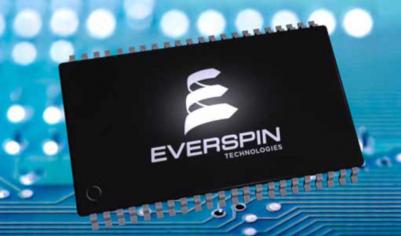
Everspin reports continued weakness in Asia Pacific, and in the industrial, consumer and automotive markets. However, it is also expecting a ramp up in both design wins and shipments for both toggle MRAM and STT-MRAM in the second half of 2024. In the next quarter, however, it expects revenues to drop significantly to $10 million to $11 million.
NETSOL signs Digi-Key MRAM and SRAM distribution agreement
Netsol is pleased to announce a global distribution partnership with Digi-Key Electronics, a pivotal development in its effort to improve global access and delivery of its MRAM and SRAM products.
Digi-Key Electronics is recognized for its immense inventory of electronic parts that are immediately available for shipment. This capability aligns perfectly with the demands of the fast-paced electronics industry, where Digi-Key has distinguished itself by ensuring rapid, efficient delivery services to its global customer base.
Through this newly forged agreement, Digi-Key will leverage its extensive online presence, spanning over 180 countries, to market and distribute Netsol's memory products to customers around the globe.
Everspin reports its Q4 2023 earning results
Everspin Technologies reported its financial results for Q4 2023, with revenues of $16.7 million and a net income of $2 million. Product sales were a bit slower than last year, but licensing and royalties were higher at $4.3 million (up from $1.1 million in 2022).
For the full year 2023, Everspin achieved record revenues of $63.8 million (up 6% from 2022), and net income of $9.1 million. At the end of the year Everspin had a cash balance of $36.9 million.
Renesas developed new STT-MRAM circuit technology, achieves the world's fastest random access speed
Renesas Electronics announced that it has developed circuit technologies for embedded STT-MRAM that reduces the energy and voltage of the memory write operation.
Renesas produced a 22-nm MCU test chip, that includes a 10.8 Mbit embedded MRAM memory cell array. It achieves a random read access frequency of over 200 MHz and a write throughput of 10.4-megabytes-per-second (MB/s).
Netsol Unveils First Standalone MRAM Using 28nm Process, Shares the Outlook for Standalone MRAM at 2023 MRAM Forum
At the 2023 MRAM Forum, a key event by the IEEE Magnetics Society tied to the IEDM conference, Mr. Noh, Chief Technology Officer at Netsol, provided an overview of the company's advancements in MRAM technology.
Mr. Noh introduced Netsol's development of its first standalone MRAM, created using 28nm eMRAM technology from Samsung Foundry. He presented the technical characteristics of the product, focusing on its data retention, endurance, resistance to magnetic interference and quality, which have been validated through extensive testing.
RAiTEK adopts Avalanche's space-grade MRAM for its satellite-based storage systems
pMTJ STT-MRAM developer Avalanche Technology announced that it is providing its Space Grade Persistent SRAM (P-SRAM) STT-MRAM products for satellite-based storage systems developed by RAiTEK.
RAiTEK has designed in a 16Mb device from Avalanche's Gen 2 Space Grade family to monitor data stream status, and a 1Gb Gen 3 Space Grade to support large configuration images for the onboard FPGA used in the drives, as part of their growing portfolio of data storage and processing solutions for the space industry.
STT-MRAM developer Numem secured its Series A funding round
High-performance STT-MRAM developer Numem announced that it has secured a Series A funding round, with investments from Cambium Capital and Doorga Capital. The company did not detail the investment amount.

In 2020, Numem announced that it has been selected for a NASA AI project, for which the company will supply its Numem NuRAM MRAM-based Memory.
Pagination
- Page 1
- Next page
